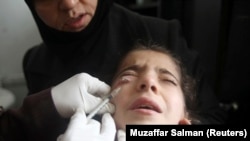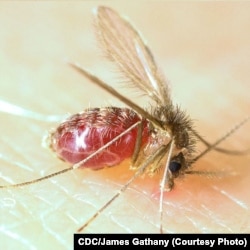Health workers in northern Syria have reported a dramatic rise in cases of Leishmaniasis--locally dubbed “Aleppo Button Disease” for the sores it produces--and are calling on the World Health Organization and other international agencies for help.
Causes and treatment
Leishmaniasis, transmitted through the bite of the common sandfly, is a complex of diseases affecting different parts of the body. The kind most commonly found in Syria is called cutaneous Leishmaniasis, which is characterized by welts or sores on the skin. These can sometimes become infected.
Mark Wiser is Associate Professor at Tulane University’s School of Public Health and Tropical Medicine in the southern U.S. city of New Orleans and an expert on Leishmaniasis. He says the skin sores usually heal on their own, but often not for months or even years, leaving ugly scars.
“Generally your immune system will control the parasite and eliminate it,” Wiser said, “and so for the most part, the disease is not life-threatening.”
However, he says, cutaneous Leishmaniasis can sometimes cause more serious problems affecting the spleen and the liver.
“And in that case, it’s very dangerous and the disease is likely to be fatal,” Wiser said.
Wiser says he is not surprised to learn about the rise in cases of Leishmaniasis in Syria, as wartime conditions can often compromise immune systems.
“And that might be why you are seeing it more in children, whose immune systems are less-developed, and then there’s going to be a lot of malnutrition, which also lowers immunity,” he said. “And if a person’s immune system is not fully able to handle the parasite then it could present fairly serious problems.”
Prevention and Treatment
Before the civil war begin in Syria, health authorities controlled outbreaks by spraying pesticides, but the breakdown of sanitation services has curtailed spraying, and not everyone can afford the price of mosquito nets, at $10 apiece.
Dr. Kerem Kinik, director of Doctors Worldwide in Turkey that provides medical help to doctors inside Syria, says Leishmaniasis was always known in the country, particularly Aleppo, and provinces along the border with Turkey. For several years, the health ministries of both countries worked together to prevent and control the incidence of the disease.
“But unfortunately, since the beginning of the Syrian uprising two years ago, there are no public services anymore, especially health services,” Kinik said. “Basic conditions are very poor for the Syrian people, so this Leishmaniasis is spreading quickly.”
Power cuts, fuel and water shortages and poor sanitation and a lack of other public services have combined to create conditions ripe for transmission of the disease. Kinik says it is difficult to assess the exact number of cases inside Syria today.
“Before the conflict, the program had reduced the number of cases in Syria to 3,000 to 4,000,” Kinik said. But Turkey’s Zaman newspaper reported recently that 100,000 cases of leishmaniasis have been diagnosed since the start of the crisis.
The drug Glucantime, which is injected directly into the sores, is usually the first-line treatment, but like so many medicines, it is scarce in war-torn Syria.
“This is not a commercially-available medicine in Turkey,” Kinik said, “because traditionally, we have few cases of Leishmaniasis. Now, we are trying to push the public health authority to import Glucantime, so that we can help more cases in Syria.”
Causes and treatment
Leishmaniasis, transmitted through the bite of the common sandfly, is a complex of diseases affecting different parts of the body. The kind most commonly found in Syria is called cutaneous Leishmaniasis, which is characterized by welts or sores on the skin. These can sometimes become infected.
Mark Wiser is Associate Professor at Tulane University’s School of Public Health and Tropical Medicine in the southern U.S. city of New Orleans and an expert on Leishmaniasis. He says the skin sores usually heal on their own, but often not for months or even years, leaving ugly scars.
“Generally your immune system will control the parasite and eliminate it,” Wiser said, “and so for the most part, the disease is not life-threatening.”
However, he says, cutaneous Leishmaniasis can sometimes cause more serious problems affecting the spleen and the liver.
“And in that case, it’s very dangerous and the disease is likely to be fatal,” Wiser said.
Wiser says he is not surprised to learn about the rise in cases of Leishmaniasis in Syria, as wartime conditions can often compromise immune systems.
“And that might be why you are seeing it more in children, whose immune systems are less-developed, and then there’s going to be a lot of malnutrition, which also lowers immunity,” he said. “And if a person’s immune system is not fully able to handle the parasite then it could present fairly serious problems.”
Basic conditions are very poor for the Syrian people, so this Leishmaniasis is spreading quicklyDr. Kerem Kinik, Director, Doctor’s Worldwide,Turkey
Prevention and Treatment
Before the civil war begin in Syria, health authorities controlled outbreaks by spraying pesticides, but the breakdown of sanitation services has curtailed spraying, and not everyone can afford the price of mosquito nets, at $10 apiece.
Dr. Kerem Kinik, director of Doctors Worldwide in Turkey that provides medical help to doctors inside Syria, says Leishmaniasis was always known in the country, particularly Aleppo, and provinces along the border with Turkey. For several years, the health ministries of both countries worked together to prevent and control the incidence of the disease.
“But unfortunately, since the beginning of the Syrian uprising two years ago, there are no public services anymore, especially health services,” Kinik said. “Basic conditions are very poor for the Syrian people, so this Leishmaniasis is spreading quickly.”
Power cuts, fuel and water shortages and poor sanitation and a lack of other public services have combined to create conditions ripe for transmission of the disease. Kinik says it is difficult to assess the exact number of cases inside Syria today.
“Before the conflict, the program had reduced the number of cases in Syria to 3,000 to 4,000,” Kinik said. But Turkey’s Zaman newspaper reported recently that 100,000 cases of leishmaniasis have been diagnosed since the start of the crisis.
The drug Glucantime, which is injected directly into the sores, is usually the first-line treatment, but like so many medicines, it is scarce in war-torn Syria.
“This is not a commercially-available medicine in Turkey,” Kinik said, “because traditionally, we have few cases of Leishmaniasis. Now, we are trying to push the public health authority to import Glucantime, so that we can help more cases in Syria.”






